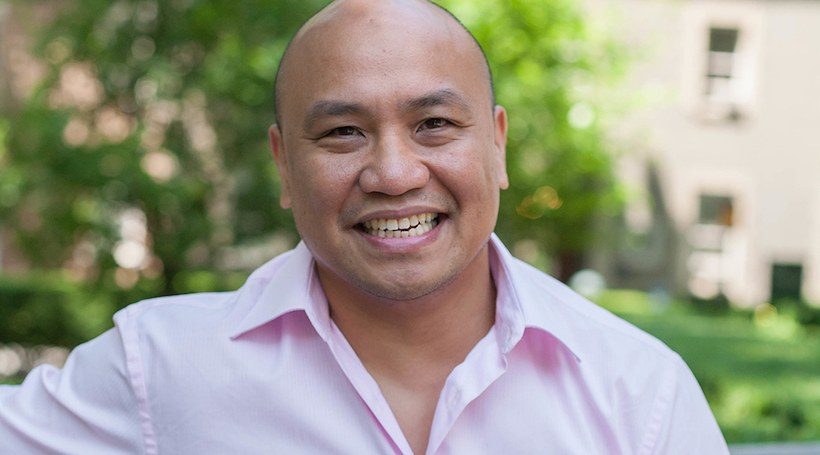Patrick Rosal’s story is exactly the type of story you would expect to hear in today’s lyrical poetry. His father was a Catholic priest when his mother became pregnant with Rosal. And when he attended Rutgers as an undergrad, he flunked out – more than once.
But like inspirational poetry, Rosal has gone on to find meaning and purpose in his work, plus many honors to go with it. He travels the world performing his poetry, and his most recent collection, “Brooklyn Antediluvian,” earned an award from the Academy of American Poets recognizing it as the most outstanding book of poetry in the previous year. Late last year, Rosal, who now teaches creative writing at Rutgers-Camden, was named a 2018 National Endowment for the Arts Literature Creative Writing (Prose) Fellow, a recognition that comes with a $25,000 grant.
Q: Your parents had an affair while your dad was a Catholic priest – that had to be difficult for them. How has that influenced your writing?
Rosal: My parents are immigrants from the Philippines; my mom arrived in the United States in 1968, and my dad came in 1963. They met in Chicago when my father was a Catholic priest. They had an affair, and my mom got pregnant.
It was a time when women were shamed for getting pregnant out of wedlock, and that much more if the father was a Catholic priest. My mom went to Canada, though they eventually reunited in Brooklyn. Right before I was born, they moved to New Jersey. I grew up in South Edison – I’m a Jersey kid through and through.
My parents, my brothers, my cousins, and my aunts and uncles are all terrific storytellers. That everyday mode of remembering and bringing our family story into our lives is really important, in terms of the way I write and teach.
Q: How did hip-hop influence you?
Rosal: In the late ’70s and early ’80s, I was listening to a lot of soul music, disco, R&B and rock, in addition to Catholic hymns and Filipino folkloric music. It was also during the era when hip-hop was catching fire.
Hip-hop connected me to my generation. It also provided me a possibility for challenging the status quo. I grew up in an era where you’d think about Beethoven and Bach – whom I love – as being the masters of music. But there are all these other musical traditions – Afro-Cuban, Filipino, Native American – that are rich, complex and sophisticated that are interwoven with these histories we don’t see. Hip-hop is an incredible repository for all that stuff, and it has given me a way to break open the very sort of rigid ideas and construction of what great culture is and where it comes from.
Q: How did you make that jump from loving hip-hop to writing your own poetry?
Rosal: I went to Rutgers University, and I flunked out a couple times. The only school I could be admitted to on short notice after being dismissed from Rutgers was Bloomfield College, back in the very town I was basically born in. I had these amazing teachers, and there was a poet named Paul Genega who taught creative writing. I took his class one of my last semesters there. That’s where I fell in love with books and literature. He taught me poems are a lot like music – you’re just composing with words instead of instruments and notes. I was hooked.
Q: Where do you find your ideas for your poems?
Rosal: The only difference between me and somebody who is not a poet is my heightened attention. I might notice something other folks don’t, and I try to remember that. I might jot it down or go home and write it. That becomes the raw material for the poems, and when I get a little bit of extra time I can sit down and look at all the little observations I’ve gathered and see if there’s a story, song or rhythm inside them.
Then I go to work and revise and revise and revise until something surprises me. Sometimes I write things that terrify or excite me – that’s when I know I’m on to something.
Q: For people who don’t read poetry – what’s so great about it?
Rosal: Poetry can do a million things, and it can do nothing. It can connect people across time and space, and it can connect you to the mind of someone else whom you might not know.
Q: What did you think when you won the NEA fellowship?
Rosal: I was elated. It’s complicated to think about how far my family has come. I’m two generations removed from my grandfather being a sugarcane cutter in Hawaii, and my parents coming over as immigrants and being disparaged for the way they spoke English. Some people even look at me and can’t believe I speak English. Now here I am, with this very prestigious, national fellowship. It was very moving, and complicated.
Q: Do you have any advice to offer aspiring writers?
Rosal: One of the great mistakes young writers make is they want to write for 100 or 1,000 or 7 million people. If you write for one beloved and you can say something true and difficult, the truth of that difficulty and that beauty will naturally resonate with a larger audience. But you have to begin small.














